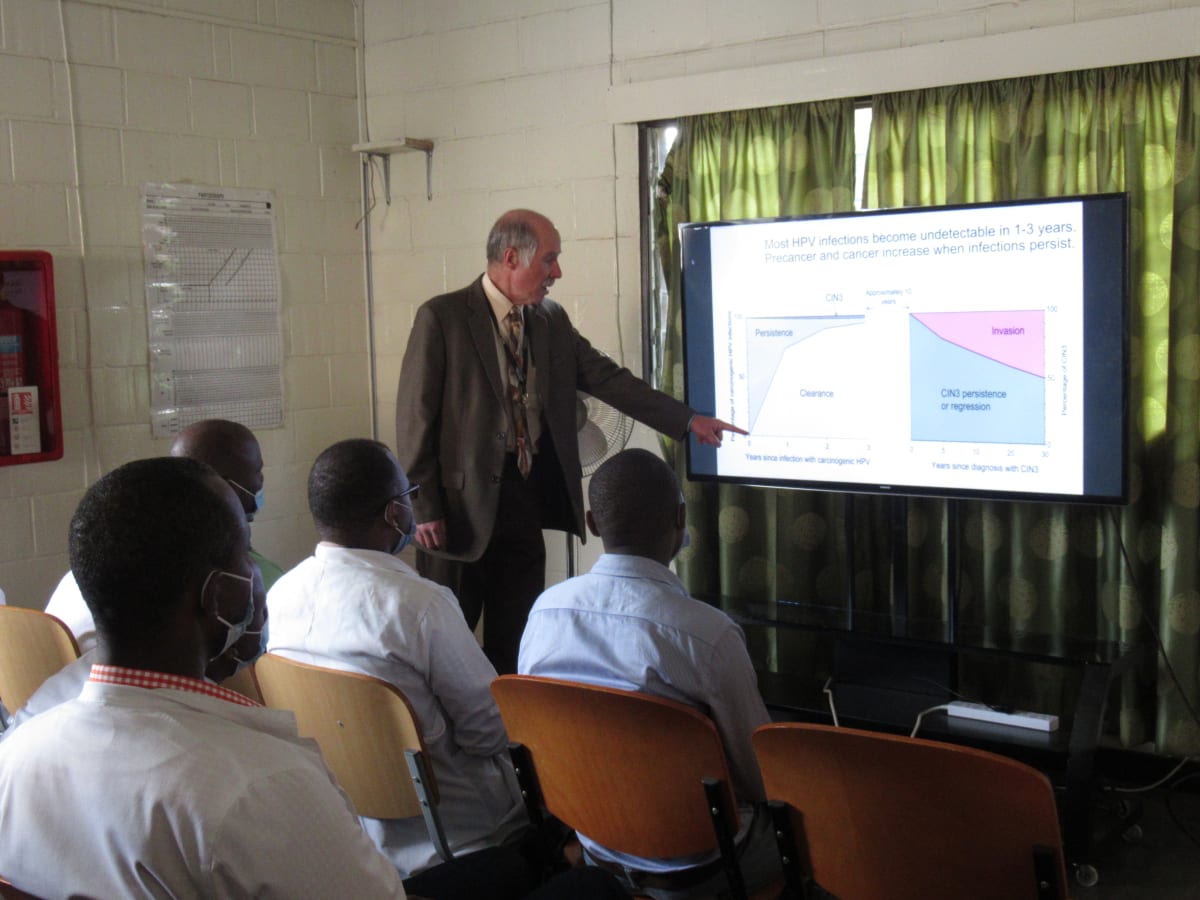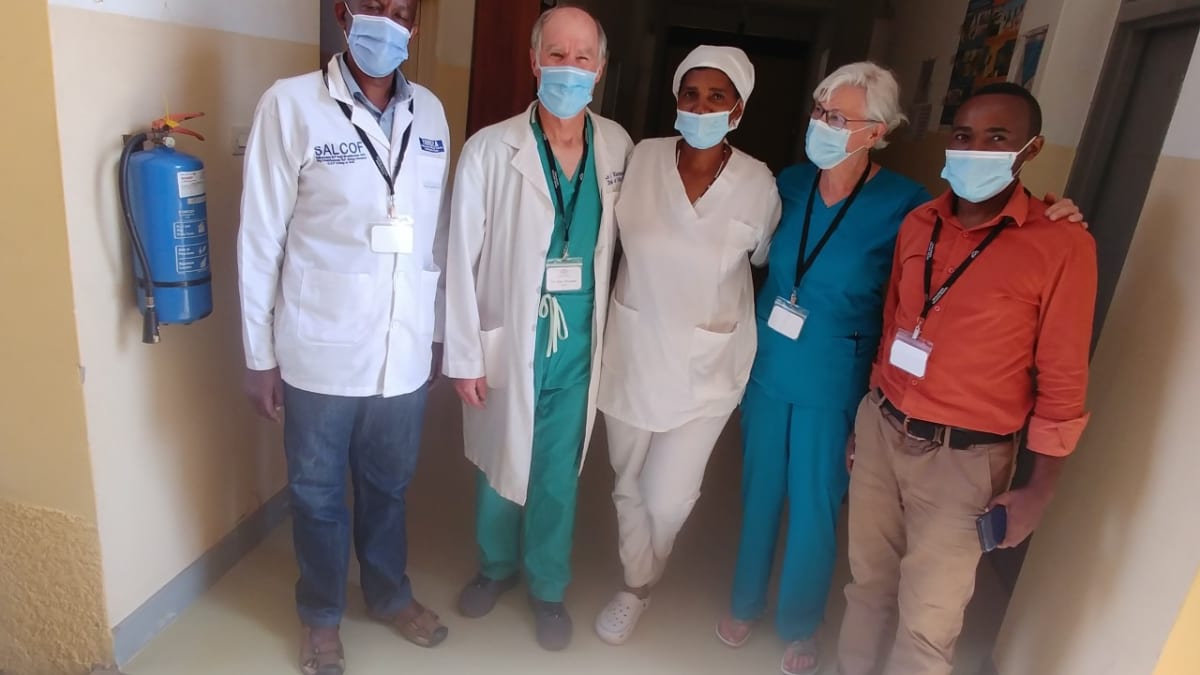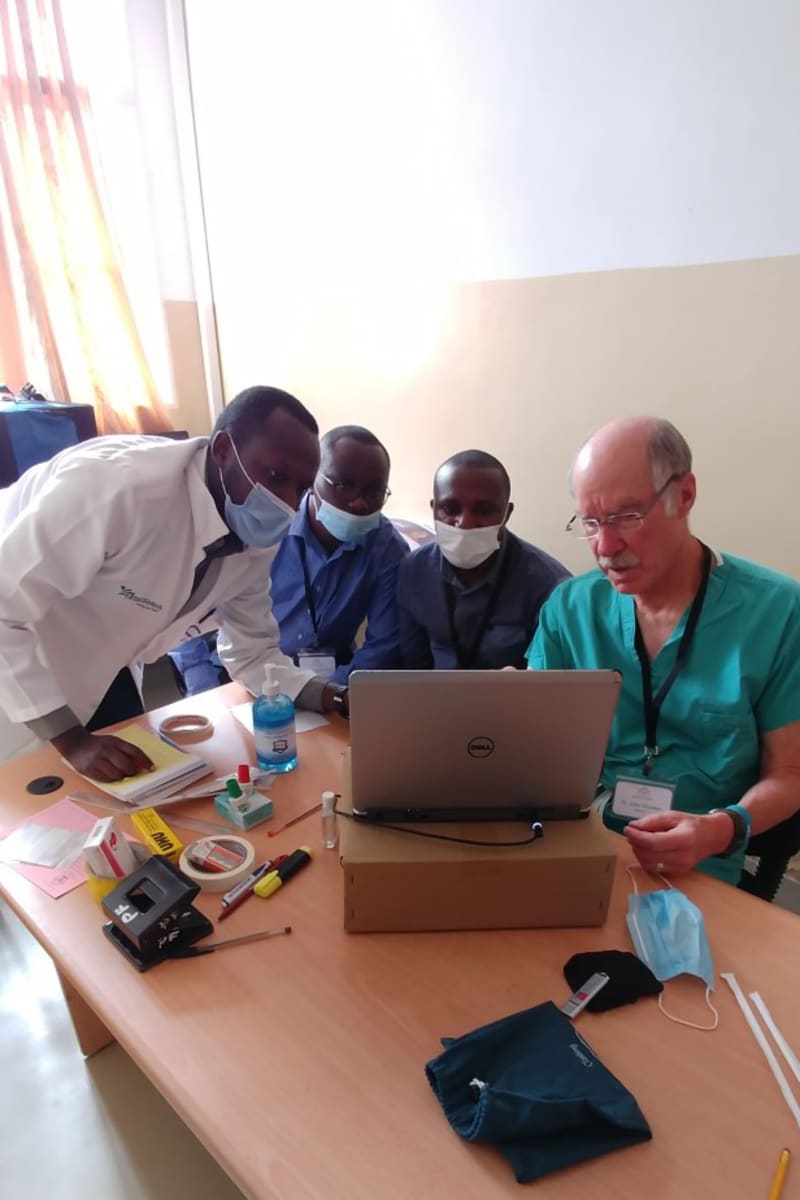The incidence of cervical cancer in Rwanda is 28.2 per 100, 000 women, second only to breast cancer, and higher than in the African continent as a whole. The death rate at 20.1 is higher than from any other malignancy in Rwanda. The high rates of this cancer in spite of a national vaccination effort are largely due to the lack of a screening infrastructure. Rwanda lacks a cadre of healthcare professionals trained in secondary cervical cancer prevention procedures, i.e. visual inspection with acetic acid (VIA) HPV testing, colposcopy and in the ambulatory procedures that can treat identified precancers and prevent invasive cancer, i.e. LEEP, cryotherapy, and thermal ablation. I will be going to Rwanda as part of a project invited by the OB/GYN Department at the University of Rwanda and cosponsored by Worldwide Healing Hands (WHH), a 501 (c)3 organization, MD Anderson Cancer Center and ASCCP to train Rwandan obstetrics and Gynecology residents to perform these procedures as part of a screen-and-treat cervical cancer prevention regimen.
The first phase of this training will take place prior to traveling to Rwanda with a virtual didactic training session for the Rwandan ob/gyn residents on cervical cancer prevention. I will be among the faculty. The second phase of the training will take place in person two months later, May 28th through June 12th, 2021. For this phase, I will join a number of volunteer healthcare providers flying to Rwanda to provide hands-on training in VIA, colposcopy, LEEP and thermal ablation for the same group of ob/gyn residents, their faculty and support staff. After returning to the U.S., I will join the MD Anderson faculty in facilitating monthly Project ECHO tele-mentoring sessions with the newly trained Rwandan providers. These sessions are designed to reinforce what has been learned and advise in the management of difficult cases.
The immediate beneficiaries of this project will be ob/gyn residents in training at the University Teaching Hospital of Kigali. The ultimate beneficiaries, however will be the women of Rwanda who are subject to very high rates and mortality from cervical cancer, a largely preventable disease. The training of ob/gyn residents and junior faculty in the techniques of cervical cancer prevention, will not only enable them to treat the women of Rwanda, but will also prepare them to pass on the learned skills to subsequent generations of ob/gyn physicians.
This project will provide a sustainable, replicable, and cost-effective program that will result in cervical cancer prevention training for over 50 Rwandan medical personnel and ultimately prevent cancer related morbidity and mortality for women in Rwanda. The potential impact of preventing cancer deaths in these women, their children and partners is obviously immense.
The inclusion of MD Anderson among the sponsors will ensure that the training provided to medical staff during our time in Rwanda is reinforced with monthly cervical cancer ECHO (Zoom based) conferences. (I am currently part of the faculty of similar conferences for women's healthcare providers in Cameroon.) Additionally, the University of Rwanda OB/GYN Department will aid in the sustainability of this program through promoting this training to interested faculty and residents and by encouraging their medical residents to train rural medical staff in cervical cancer screening and treatment procedures after our departure. Worldwide Healing Hands is planning to return to Rwanda at the end of 2021 or beginning of 2022 to ensure that this education program is running smoothly and to assist the University of Rwanda OB/GYN Department in training the next group of Rwandan medical residents. I hope to participate in that aspect of the project either on site or as a consultant.






The incidence of cervical cancer is higher in Eastern Africa then in other regions of the world. In Rwanda in 2020, cervical cancer comprised 23.9% of cancers in women, barely second to breast cancer which made up 24% of cancers. More women die from cancer of the cervix than breast cancer or cancer at any other site. The Director General of the World Health Organization has called for elimination of cervical cancer using a three part strategy of immunizing 90% of teenagers, screening 70% of women twice- by age 35 and again by age 45 using a high performance screening test such as HPV DNA- and treating 90% of women with cancer or precancer. The Rwandan Ministry of Health has been very successful in the first of these objectives, vaccinating over 90% of girls aged 11-15 annually since 2012. Lack of Resources in this low income country has severely limited Rwanda’s ability to meet the other two objectives.
The obstetrics and gynecology residency at the University of Rwanda requested assistance from the Cervical Cancer Outreach Program at MD Anderson and the NGO, Worldwide Healing Hands, to teach their residents the fundamentals of cervical cancer screening including colposcopy, visual inspection with acetic acid (VIA) and treatment with thermal ablation and LEEP. The ASCCP Committee on International Education and Humanitarian Outreach joined in these efforts. I along with Laura Fry, MD participated on behalf of the ASCCP Committee. A three part training is being offered. In March 2021, a 6 hour virtual colposcopy course was presented. A hands-on training in Kigali with travel supported by Doximity Foundation was just completed June 7 – 15. Going forward, this will be followed with monthly virtual cervical cancer prevention ECHO conferences coordinated by MD Anderson and the International Gynecologic Cancer Society (IGCS).
Our team was coordinated by Dr. Paula Dhanda of Worldwide Healing Hands and Dr. Diomede Ntasumbumuyange of the Univ. of Rwanda. We began with a day of didactics and simulations for half of the 40 ob/gyn residents. This was repeated the next week for the rest of the residents. The next several days our group worked with the residents in a clinical setting, screening and treating patients at either CHUK, the Kigali University Teaching Hospital or the Muhima District Hospital. Dr. Fry and I were at the Muhima Hospital, a small aging facility about 15 minutes from CHUK. The facilities were limited, and we had only one exam room, but there was an excellent colposcope and LEEP machine, and we brought a thermal ablation device. The residents were sharp and very engaged in the training. Our nurse, Jeanne D’arc, was enthusiastic and extremely helpful. We divided the 7-8 residents in our charge into two groups. While half worked with one of us seeing a patient, the other residents gathered around a laptop to review case studies in colposcopy. In the 5 days of clinical work, the residents had the opportunity to perform VIA and to use the colposcope on a variety of patients seeing normal and abnormal cervical findings. They also were able to observe LEEP and perform thermal ablation. The patients were very grateful, including one, a refugee from the recent volcanic eruption north of Goma, Democratic Republic of Congo, who insisted on taking selfies with us.
The residents were very appreciative of the training. This project will help them to understand the importance of cervical cancer screening and help them, as the future clinical leaders of their country, to continue Rwanda on its path to eliminating this disease.